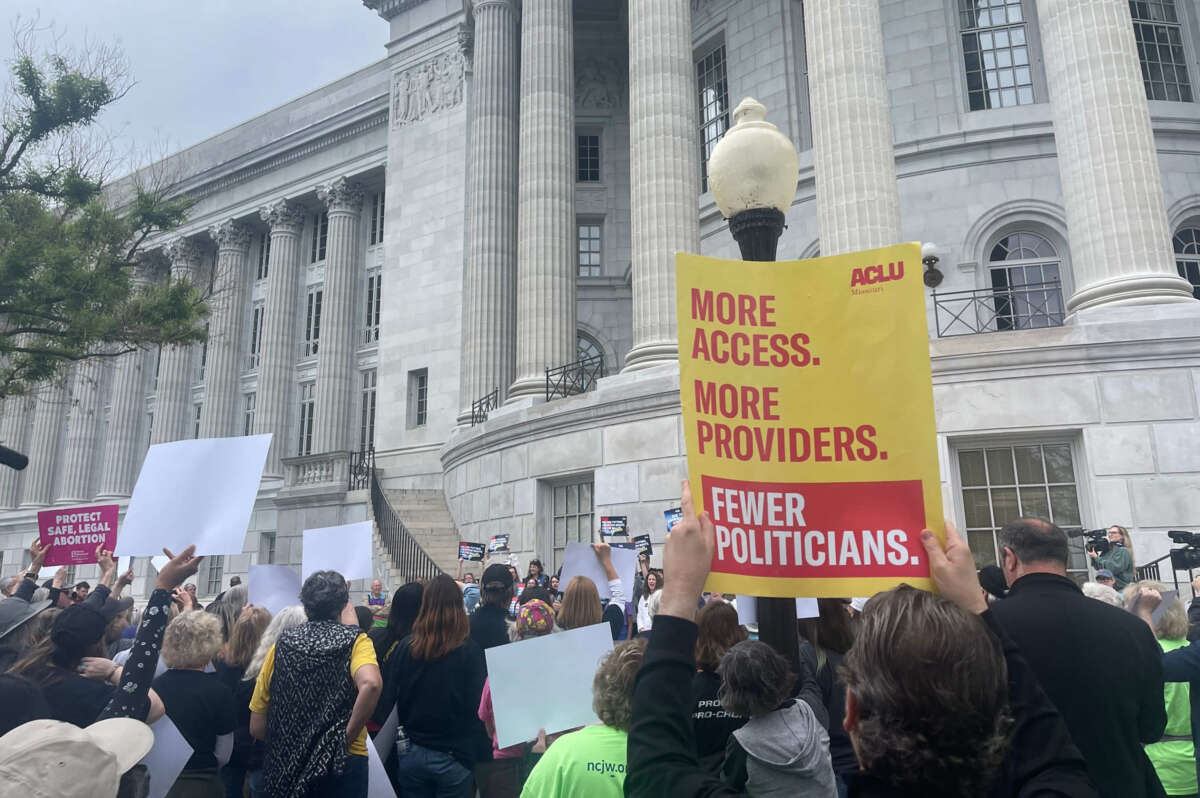Truthout is an indispensable resource for activists, movement leaders and workers everywhere. Please make this work possible with a quick donation.
The Missouri State Supreme Court ruled with little time to spare on Tuesday that an amendment proposal enshrining abortion and reproductive rights in the state constitution will be placed back on the November ballot, overturning a lower court ruling that had removed it just days before.
The decision, coming less than three hours before the state’s deadline to finalize the language and questions to appear on election ballots, orders Missouri Secretary of State Jay Ashcroft (R) to “certify to local election authorities that Amendment 3 be placed on the Nov. 5, 2024, general election ballot,” and to “take all steps necessary to ensure that it is on said ballot.”
The order from the state’s highest court came just days after a lower court ruled in favor of arguments from anti-abortion activists and lawmakers who sued to have the measure stricken from the ballot. Cole County Judge Christopher Limbaugh issued a ruling late last week agreeing with those individuals that the proposal, which would enshrine in the state constitution “a person’s fundamental right to reproductive freedom,” was too vague, in violation of state rules relating to ballot initiatives.
Limbaugh’s reasoning was dubious, as the ballot measure explicitly stated that a “yes” vote would protect “the right to make and carry out decisions about all matters relating to reproductive health care, including but not limited to prenatal care, childbirth, postpartum care, birth control, abortion care, miscarriage care, and respectful birthing conditions,” and that lawmakers could not regulate abortion care until the point of fetal viability.
The Missouri Supreme Court overruled Limbaugh’s decision, finding that the amendment measure should remain on the ballot and that it did not violate ballot initiative rules.
The day before the State Supreme Court ruled on the matter, Ashcroft also tried to decertify the measure through his own office. The court found his action to be improper, noting that he had previously certified the initiative.
“Any action taken to change that decision weeks after the statutory deadline expired is a nullity and of no effect,” the court ruled.
By 3:30 pm on Tuesday afternoon, the measure was listed once again on the Missouri Secretary of State office’s website.
Abortion rights proponents, including organizations aligned with the movement to pass the measure, lauded the Missouri Supreme Court’s action.
“What this decision really says today is that we deserve to be on the ballot. That people deserve to make this decision for themselves,” said Tori Schafer, an attorney with the ACLU of Missouri.
Rachel Sweet, a campaign manager for Missourians for Constitutional Freedom, the group that managed the signature drive and subsequent push for the measure to be on the November ballot, also celebrated the ruling, and noted that it would impact similar movements in the years ahead.
“This fight was not just about this amendment — it was about defending the integrity of the initiative petition process and ensuring that Missourians can shape their future directly,” Sweet said.
Like many other statewide abortion rights initiatives that have passed since 2022, when the federal Supreme Court upended protections established in Roe v. Wade, the Missouri ballot measure is viewed as likely to be approved by voters this fall. According to a St. Louis University/YouGov poll in August, 52 percent of Missourians support the measure, while only 34 percent said they oppose it. A simple majority vote is all that is needed to pass it into law.
A terrifying moment. We appeal for your support.
In the last weeks, we have witnessed an authoritarian assault on communities in Minnesota and across the nation.
The need for truthful, grassroots reporting is urgent at this cataclysmic historical moment. Yet, Trump-aligned billionaires and other allies have taken over many legacy media outlets — the culmination of a decades-long campaign to place control of the narrative into the hands of the political right.
We refuse to let Trump’s blatant propaganda machine go unchecked. Untethered to corporate ownership or advertisers, Truthout remains fearless in our reporting and our determination to use journalism as a tool for justice.
But we need your help just to fund our basic expenses. Over 80 percent of Truthout’s funding comes from small individual donations from our community of readers, and over a third of our total budget is supported by recurring monthly donors.
Truthout has launched a fundraiser to add 500 new monthly donors in the next 9 days. Whether you can make a small monthly donation or a larger one-time gift, Truthout only works with your support.
